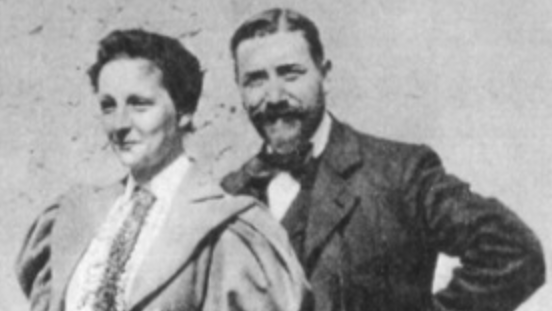Élisabeth Leseur (1866-1914) was a married laywoman. Her husband, Félix, a doctor, lost his Catholic faith shortly before their 1889 wedding and became a publicly vocal atheist.
Ironically, the suffering she endured as a result invited her to a deeper exploration of her own, until that point rather conventional, faith. She came to see that enduring the anti-Catholic jibes of her husband, whom she loved deeply, and his friends could be a hidden form of mortification.
“Silence is sometimes an act of energy, and smiling, too.”
But Leseur was no retiring faux-martyr. A lively hostess, she carried out her social duties with grace and good humor. A loyal friend, she carried on a wide-ranging spiritual correspondence — mostly unbeknownst to her husband — for the duration of her marriage.
All the while, she continued to develop a rich and hidden interior life: her collected journals are now widely considered a spiritual classic.
Her entry for May 3, 1904, is typical: “Has my life known any unhappier time than this? ... And yet through all these trials and in spite of the lack of interior joy, there is a deep place that all these waves of sorrow cannot touch. … [T]here I can feel how completely one with God I am, and I regain strength and serenity in the heart of Christ. My God, give health and happiness to those I love and give us all true light and charity.”
In frail health all her life — she and Félix were unable to have children — by July 1913 she was bedridden by the breast cancer to which she would succumb the following year. In the silence of her heart, she made the decision to offer up all her sufferings for the conversion of her husband’s soul.
Bernadette Chovelon’s “Salt and Light: The Spiritual Journey of Élisabeth and Félix Leseur” (Ignatius Press, $17.95) leans hagiographic (surely Élisabeth must have uttered an unkind word or lost her patience once or twice in her life).
But the book is also thoroughly researched, deeply felt, and provides a full and fascinating backstory to this seemingly ordinary bourgeois wife with an extraordinary inner life.
Knowing that her disease was terminal, Élisabeth still attended Mass several times a week, sought spiritual direction, and resolved to offer up her final agony.
Aware of the dangers of the sluggishness and despondency that can arise from serious illness, she continued to attend to her personal grooming, to radiate good cheer, and to make her house a pleasant place to visit: duties of her state in life, as she saw it.
Élisabeth resolved “to avoid as much as possible speaking of myself, of my trials, of my illness, above all of my soul and of the graces received. … And now, my God, I offer you the new life open before me. I want, sustained by your grace, to become a new woman, a Christian, an apostle.”
She wrote that she needed to become “a little worldly,” notes Chovelon, “out of love for her friends and out of an openness to what was important in their lives.”
Her mission became: “In brief: to reserve for God alone the depths of my soul and my inner or Christian life. Give others serenity, charm, goodness, useful word or deeds. To make loved through me, Christian truth, but to say its name only at an explicit, or at least fairly clear, prompting In order to seem truly providential… To be austere for myself, as attractive as possible for others.”
“We must never reject anyone who seeks to approach us spiritually; perhaps that person, consciously or unconsciously, is in quest of the ‘unknown God,’ ” she wrote, “and has sensed in us something that reveals his presence; perhaps he or she thirsts for truth and feels that we live by this truth.”
“Look around oneself for proud sufferers in need, find them, and give them the alms of our heart, of our time, and of our tender respect.”
Perhaps her heaviest cross, especially as death approached, was not the physical pain, but rather that she could not confide to those she cherished of her spiritual journey.
The person she loved most in the world — her husband — could not begin to assuage her isolation, nor could the friends in her social circle.
After she died, Félix found among her papers a letter she had written to him revealing her fervent prayers that he would turn to Christ and become a priest.
Outraged, he set off for Lourdes in the hopes of debunking what he considered to be the crank miracles that occurred there. Instead, he had a conversion experience at the Grotto.
As the French say, “Woman’s will, God’s will.” Félix was ordained a Dominican priest in 1923. He spent much of his last 27 years promulgating the writings, and advancing the cause for beatification, of his late, eternally intercessing, wife.

